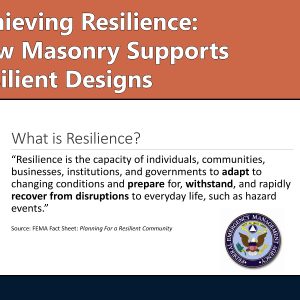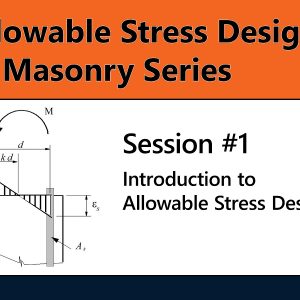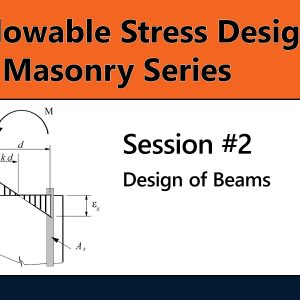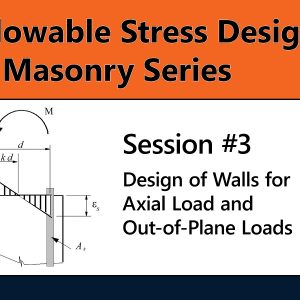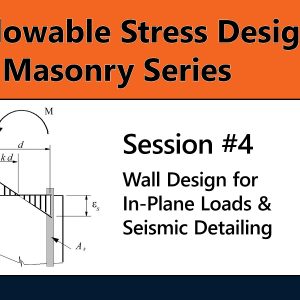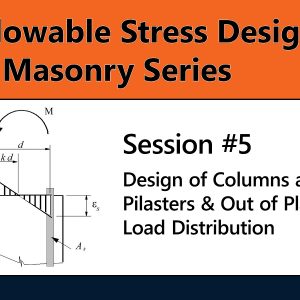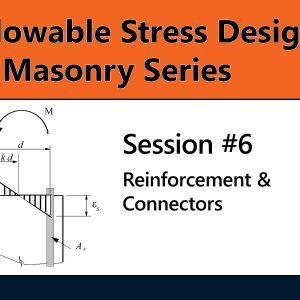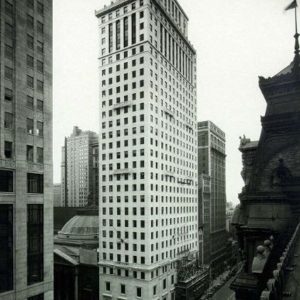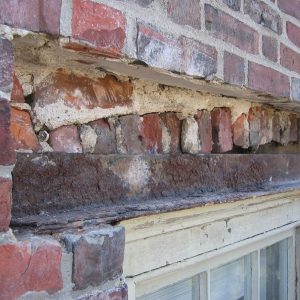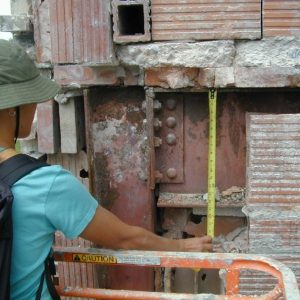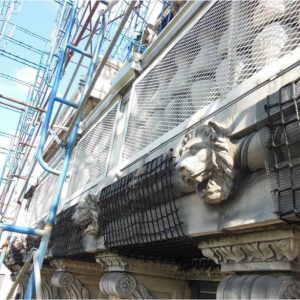Member Discount-75
TMS Members get special pricing on the following courses.
Showing 1–12 of 42 results
-
Achieving Resilience: How Masonry Supports Resilient Designs
This course provides an overview of resilient design and discusses how resilient design is and is not covered by building codes and standards. The role of masonry construction in meeting resilient design goals is explained, and the inherent properties of masonry that make it resilient are described. Examples of resilient design strategies are provided.
Learning Objectives:
- Define resilience.
- Explain how resilient designs go beyond the minimum building code requirements.
- List at least three above-code standards that can be used with resilient designs.
- Describe inherent properties of masonry that provide resilience.
$75.00 -
Allowable Stress Design
Allowable Stress Design of Masonry #1: Introduction to Allowable Stress Design
$75.00 Add to cartAllowable Stress Design of Masonry #1: Introduction to Allowable Stress Design
This introductory course reviews basic allowable stress design concepts. Dr. McGinley presents key differences between allowable stress design and strength design procedures. This session also reviews masonry assemblies and systems, noting their purposes and resistance to primary loads. Attendees will learn about typical masonry building elements and their roles in the overall structural system including walls, beams, columns, and pilasters. Future sessions of the series discuss the design of these elements. Finally, this session reviews loads and load combinations from ASCE-7 & and the IBC.
Allowable Stress Design of Masonry introduces Allowable Stress Design (ASD) of Masonry, review code requirements, and examine designs of common masonry elements including, beams, walls, columns, and pilasters. The series discusses design methodology as well as design for flexure, axial loads, and in-plane loads. It concludes with a review of requirements for reinforcement and connectors and detailing masonry effectively. It is recommended that you have a basic familiarity with masonry (consistent with content presented in the Masonry 101 Series).
View other courses in this series or purchase the Allowable Stress Design Bundle to access all 6 and save $30 compared to buying them separately.
$75.00 -
Allowable Stress Design of Masonry #2: Design of Beams
This course reviews allowable stress design of masonry beams and lintels and provides an examination of whether arching action can be used to reduce the loads on these elements. Deflection calculations are reviewed, along with code compliance requirements relating to reinforcement and grouting. This session also covers partial depth beams, deep beams, shear reinforcement, long-span beam criteria, torsion, and other requirements.
Allowable Stress Design of Masonry introduces Allowable Stress Design (ASD) of Masonry, review code requirements, and examine designs of common masonry elements including, beams, walls, columns, and pilasters. The series discusses design methodology as well as design for flexure, axial loads, and in-plane loads. It concludes with a review of requirements for reinforcement and connectors and detailing masonry effectively. It is recommended that you have a basic familiarity with masonry (consistent with content presented in the Masonry 101 Series).
View other courses in this series or purchase the Allowable Stress Design Bundle to access all 6 and save $30 compared to buying them separately.
$75.00 -
Allowable Stress Design
Allowable Stress Design of Masonry #3: Design of Walls for Axial Load and Out-of-Plane Loads
$75.00 Add to cartAllowable Stress Design of Masonry #3: Design of Walls for Axial Load and Out-of-Plane Loads
During this session, allowable stress design of masonry walls loaded with out-of-plane loads and axial loads will be reviewed. Differences in the Allowable Stress design provisions and strength design procedures will be briefly discussed, especially the secondary bending moments.
Allowable Stress Design of Masonry introduces Allowable Stress Design (ASD) of Masonry, review code requirements, and examine designs of common masonry elements including, beams, walls, columns, and pilasters. The series discusses design methodology as well as design for flexure, axial loads, and in-plane loads. It concludes with a review of requirements for reinforcement and connectors and detailing masonry effectively. It is recommended that you have a basic familiarity with masonry (consistent with content presented in the Masonry 101 Series).
View other courses in this series or purchase the Allowable Stress Design Bundle to access all 6 and save $30 compared to buying them separately.
$75.00 -
Allowable Stress Design
Allowable Stress Design of Masonry #4: Wall Design for In-Plane Loads & Seismic Detailing
$75.00 Add to cartAllowable Stress Design of Masonry #4: Wall Design for In-Plane Loads & Seismic Detailing
Shear walls are critical building elements to resist in-plane loads and are, for masonry, the wind and seismic-force-resisting system. This session reviews Allowable Stress Design of shear walls along with both seismic detailing requirements and minimum/maximum detailing requirements for such walls. Design for in-plane shear, including shear friction, and in-plane flexure is explored and examples provided. The effect of openings are also be examined.
Allowable Stress Design of Masonry introduces Allowable Stress Design (ASD) of Masonry, review code requirements, and examine designs of common masonry elements including, beams, walls, columns, and pilasters. The series discusses design methodology as well as design for flexure, axial loads, and in-plane loads. It concludes with a review of requirements for reinforcement and connectors and detailing masonry effectively. It is recommended that you have a basic familiarity with masonry (consistent with content presented in the Masonry 101 Series).
View other courses in this series or purchase the Allowable Stress Design Bundle to access all 6 and save $30 compared to buying them separately.
$75.00 -
Allowable Stress Design
Allowable Stress Design of Masonry #5: Design of Columns and Pilasters & Out of Plane Load Distribution
$75.00 Add to cartAllowable Stress Design of Masonry #5: Design of Columns and Pilasters & Out of Plane Load Distribution
Shear walls are critical building elements to resist in-plane loads and are, for masonry, the wind and seismic-force-resisting system. This session reviews Allowable Stress Design of shear walls along with both seismic detailing requirements and minimum/maximum detailing requirements for such walls. Design for in-plane shear, including shear friction, and in-plane flexure is explored and examples provided. The effect of openings are also be examined.
Allowable Stress Design of Masonry introduces Allowable Stress Design (ASD) of Masonry, review code requirements, and examine designs of common masonry elements including, beams, walls, columns, and pilasters. The series discusses design methodology as well as design for flexure, axial loads, and in-plane loads. It concludes with a review of requirements for reinforcement and connectors and detailing masonry effectively. It is recommended that you have a basic familiarity with masonry (consistent with content presented in the Masonry 101 Series).
View other courses in this series or purchase the Allowable Stress Design Bundle to access all 6 and save $30 compared to buying them separately.
$75.00 -
Allowable Stress Design
Allowable Stress Design of Masonry #6: Reinforcement & Connectors
$75.00 Add to cartAllowable Stress Design of Masonry #6: Reinforcement & Connectors
Reinforcement and connectors are essential to ensure a proper load path in masonry buildings. This session reviews basic detailing requirements for reinforcement and connectors and specific requirements for their design when using allowable stress procedures for masonry. Lap length requirements for reinforcement, use of hooks and confinement bars, and the design of anchor bolts are also be reviewed.
Allowable Stress Design of Masonry introduces Allowable Stress Design (ASD) of Masonry, review code requirements, and examine designs of common masonry elements including, beams, walls, columns, and pilasters. The series discusses design methodology as well as design for flexure, axial loads, and in-plane loads. It concludes with a review of requirements for reinforcement and connectors and detailing masonry effectively. It is recommended that you have a basic familiarity with masonry (consistent with content presented in the Masonry 101 Series).
View other courses in this series or purchase the Allowable Stress Design Bundle to access all 6 and save $30 compared to buying them separately.
$75.00 -
Historic Masonry
Assessment, Maintenance, and Repair of Transitional Masonry Structures #1: Review of Common Masonry Materials
$75.00 Add to cartAssessment, Maintenance, and Repair of Transitional Masonry Structures #1: Review of Common Masonry Materials
This session reviews masonry materials commonly used in cladding systems between the 1880 and 1945 in North America, including brick, terra cotta, concrete masonry, cast stone, natural stone, and mortar. Common material properties, uses, and deterioration mechanisms will be presented.
It is recommended that attendees watch Masonry 101 – Introduction to Masonry Units before watching this webinar in order to become familiar with the terminology used. Purchasing this course also provides free access to that course.
During Existing Masonry Night School: Assessment, Maintenance, and Repair of Transitional Masonry Structures, instructors discuss the most common issues in assessing, maintaining, and where needed, repairing masonry cladding systems constructed in North America between the 1880 and 1945.
View other courses in this series or purchase the Existing Masonry Bundle to access all 7 and save 10% compared to buying them separately.
$75.00 -
Historic Masonry
Assessment, Maintenance, and Repair of Transitional Masonry Structures #2: Masonry Systems
$75.00 Add to cartAssessment, Maintenance, and Repair of Transitional Masonry Structures #2: Masonry Systems
This session discusses the typical masonry exterior wall systems, commonly referred to as transitional masonry wall systems and how to identify them. These wall systems combine aspects of both load-bearing masonry and modern curtain wall systems having structural frames. The unique features of such construction are examined along with how these systems work structurally, how they deteriorate, and how they manage water, temperature, air, and vapor transmission. Knowing how these wall systems behave will assist in determining what repair methods and procedures to use.
During Existing Masonry Night School: Assessment, Maintenance, and Repair of Transitional Masonry Structures, instructors discuss the most common issues in assessing, maintaining, and where needed, repairing masonry cladding systems constructed in North America between the 1880 and 1945.
View other courses in this series or purchase the Existing Masonry Bundle to access all 7 and save 10% compared to buying them separately.
$75.00 -
Historic Masonry
Assessment, Maintenance, and Repair of Transitional Masonry Structures #3: Planning a Building Investigation
$75.00 Add to cartAssessment, Maintenance, and Repair of Transitional Masonry Structures #3: Planning a Building Investigation
This session of the existing masonry series focuses on the important aspects of developing an investigation program for a transitional masonry building, including information to gather, areas for inspection, ongoing monitoring, the potential for investigative openings and laboratory testing to inform potential structural analyses to consider. Examples of different deterioration mechanisms and manifestations will be highlighted.
During Existing Masonry Night School: Assessment, Maintenance, and Repair of Transitional Masonry Structures, instructors discuss the most common issues in assessing, maintaining, and where needed, repairing masonry cladding systems constructed in North America between the 1880 and 1945.
View other courses in this series or purchase the Existing Masonry Bundle to access all 7 and save 10% compared to buying them separately.
$75.00 -
Member Discount-75
Assessment, Maintenance, and Repair of Transitional Masonry Structures #4: Testing & Analysis
$75.00 Add to cartAssessment, Maintenance, and Repair of Transitional Masonry Structures #4: Testing & Analysis
Building on concepts presented during prior sessions, this session discusses approaches for obtaining information on material properties and how to use that information to understand structural capacity following applicable codes and guidelines. Several in situ methods are available for determining masonry mechanical properties including compression and shear strength. Laboratory tests are also used for determining material strength in addition to material characteristics such as mortar composition, masonry pore structure, and moisture content. The process of evaluating structural and nonstructural component compliance will be discussed in the context of guidelines and building codes, concentrating on transitional masonry building typologies.
During Existing Masonry Night School: Assessment, Maintenance, and Repair of Transitional Masonry Structures, instructors discuss the most common issues in assessing, maintaining, and where needed, repairing masonry cladding systems constructed in North America between the 1880 and 1945.
View other courses in this series or purchase the Existing Masonry Bundle to access all 7 and save 10% compared to buying them separately.
$75.00 -
Member Discount-75
Assessment, Maintenance, and Repair of Transitional Masonry Structures #5: Rehabilitation Options for Transitional Masonry
$75.00 Add to cartAssessment, Maintenance, and Repair of Transitional Masonry Structures #5: Rehabilitation Options for Transitional Masonry
Once the assessment is complete and the deterioration mechanisms are known, rehabilitation options can be considered. This session introduces rehabilitation options for the transitional masonry wall system to be considered based on deterioration mechanisms, including those related to structural concerns and water management. The session discusses the potential influence of the Secretary of the Interior Standards for the Treatment of Historic Properties in rehabilitation options as they apply to these buildings.
During Existing Masonry Night School: Assessment, Maintenance, and Repair of Transitional Masonry Structures, instructors discuss the most common issues in assessing, maintaining, and where needed, repairing masonry cladding systems constructed in North America between the 1880 and 1945.
View other courses in this series or purchase the Existing Masonry Bundle to access all 7 and save 10% compared to buying them separately.
$75.00

